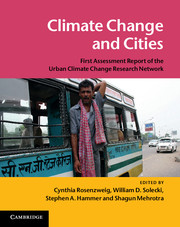Book contents
- Frontmatter
- Contents
- Foreword – Anna Tibaijuka
- Foreword – Rajendra Kumar Pachauri
- Foreword – Mayor Michael R. Bloomberg
- Foreword – Jeffrey D. Sachs
- Preface
- Executive Summary
- Part I Introduction
- Part II Defining the risk framework
- Part III Urban sectors
- Part IV Cross-cutting issues
- Conclusion: Moving forward
- Appendix A City case studies and topics in vulnerability, adaptation and mitigation
- Appendix B Acronyms and abbreviations
- Appendix C Steering Group, ARC3 authors, and reviewers
- Index
Executive Summary
Published online by Cambridge University Press: 05 August 2012
- Frontmatter
- Contents
- Foreword – Anna Tibaijuka
- Foreword – Rajendra Kumar Pachauri
- Foreword – Mayor Michael R. Bloomberg
- Foreword – Jeffrey D. Sachs
- Preface
- Executive Summary
- Part I Introduction
- Part II Defining the risk framework
- Part III Urban sectors
- Part IV Cross-cutting issues
- Conclusion: Moving forward
- Appendix A City case studies and topics in vulnerability, adaptation and mitigation
- Appendix B Acronyms and abbreviations
- Appendix C Steering Group, ARC3 authors, and reviewers
- Index
Summary
Cities are home to over half of the world's people and are at the forefront of the climate change issue. Climate change exerts added stress on urban areas through increased numbers of heat waves threatening the health of the elderly, the infirm, and the very young; more frequent and intense droughts and inland floods compromising water supplies; and for coastal cities, enhanced sea level rise and storm surges affecting inhabitants and essential infrastructure, property, and ecosystems. At the same time, cities are responsible for no less than 40% of global greenhouse gas emissions, and given current demographic trends, this level will likely only increase over time. These challenges highlight the need for cities to rethink how assets are deployed and people protected, how infrastructure investments are prioritized, and how climate will affect long-term growth and development plans.
- Type
- Chapter
- Information
- Climate Change and CitiesFirst Assessment Report of the Urban Climate Change Research Network, pp. xv - xxivPublisher: Cambridge University PressPrint publication year: 2011



